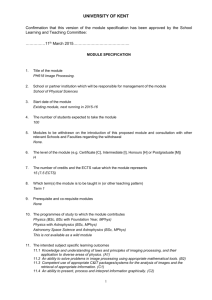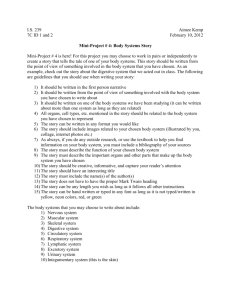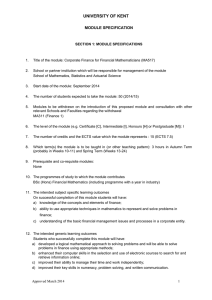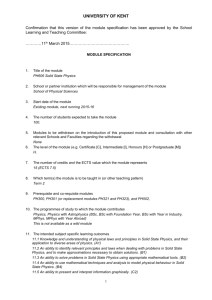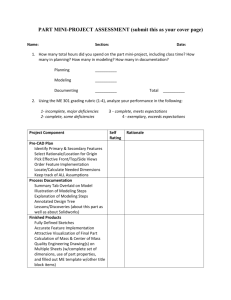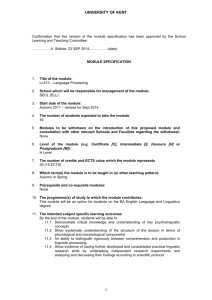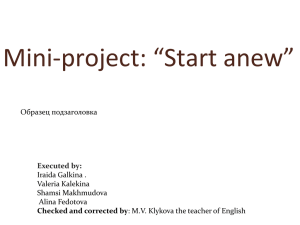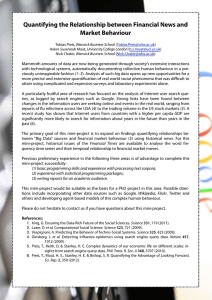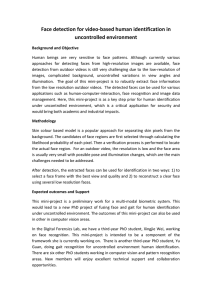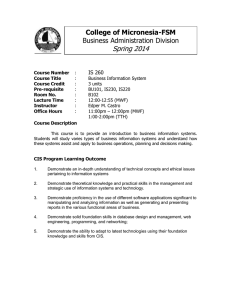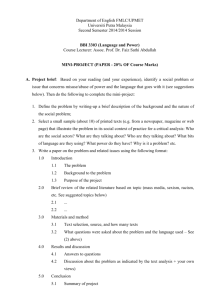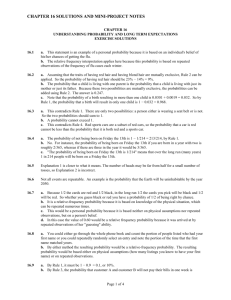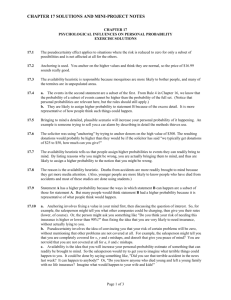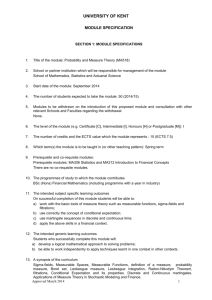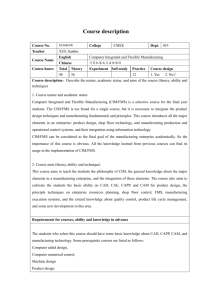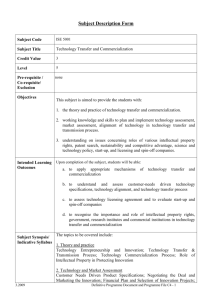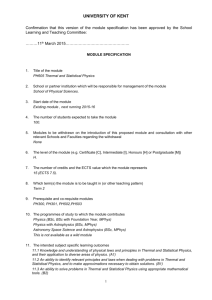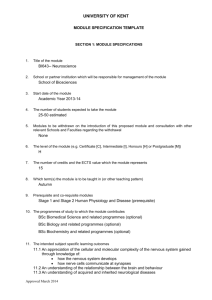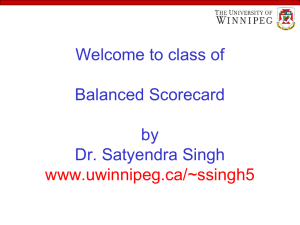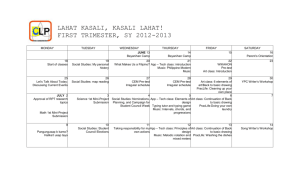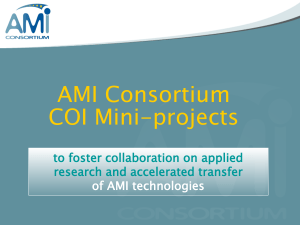PH617 Physics Project Laboratory
advertisement
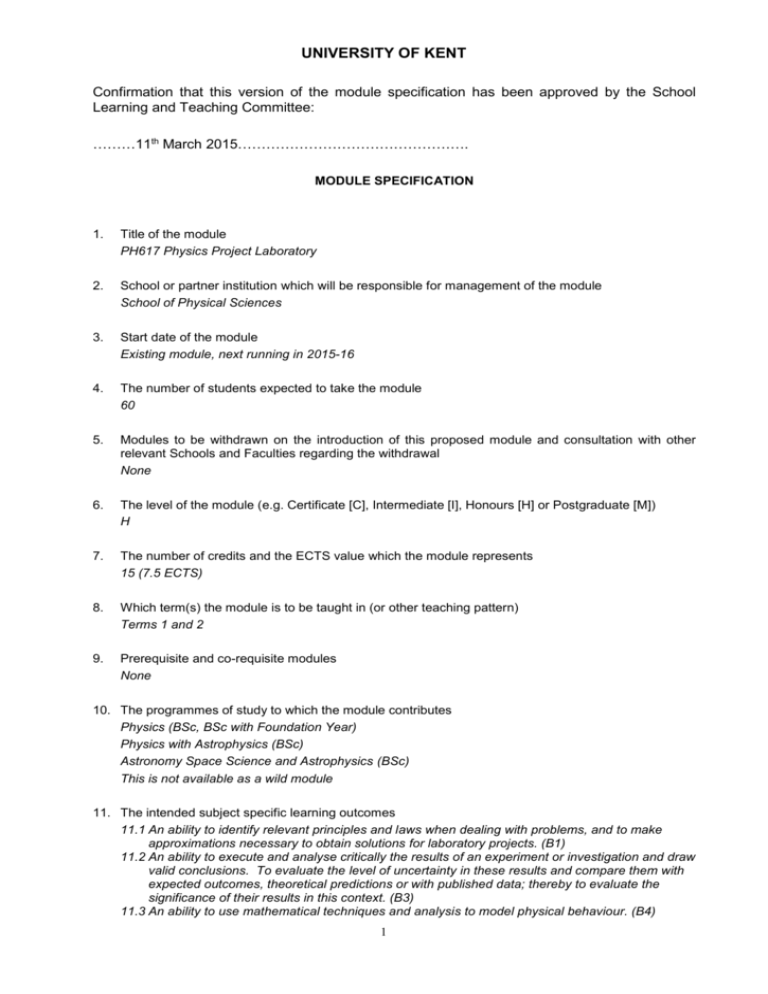
UNIVERSITY OF KENT Confirmation that this version of the module specification has been approved by the School Learning and Teaching Committee: ………11th March 2015…………………………………………. MODULE SPECIFICATION 1. Title of the module PH617 Physics Project Laboratory 2. School or partner institution which will be responsible for management of the module School of Physical Sciences 3. Start date of the module Existing module, next running in 2015-16 4. The number of students expected to take the module 60 5. Modules to be withdrawn on the introduction of this proposed module and consultation with other relevant Schools and Faculties regarding the withdrawal None 6. The level of the module (e.g. Certificate [C], Intermediate [I], Honours [H] or Postgraduate [M]) H 7. The number of credits and the ECTS value which the module represents 15 (7.5 ECTS) 8. Which term(s) the module is to be taught in (or other teaching pattern) Terms 1 and 2 9. Prerequisite and co-requisite modules None 10. The programmes of study to which the module contributes Physics (BSc, BSc with Foundation Year) Physics with Astrophysics (BSc) Astronomy Space Science and Astrophysics (BSc) This is not available as a wild module 11. The intended subject specific learning outcomes 11.1 An ability to identify relevant principles and laws when dealing with problems, and to make approximations necessary to obtain solutions for laboratory projects. (B1) 11.2 An ability to execute and analyse critically the results of an experiment or investigation and draw valid conclusions. To evaluate the level of uncertainty in these results and compare them with expected outcomes, theoretical predictions or with published data; thereby to evaluate the significance of their results in this context. (B3) 11.3 An ability to use mathematical techniques and analysis to model physical behaviour. (B4) 1 UNIVERSITY OF KENT 11.4 Competent use of appropriate C&IT packages/systems for the analysis of data and the retrieval of appropriate information. (C1) 11.5 An ability to present and interpret information graphically for project reports. (C2) 11.6 An ability to communicate scientific information, in particular to produce clear and accurate scientific reports. (C3) 11.7 A familiarity with laboratory apparatus and techniques, including relevant aspects of Health & Safety. (C4) 11.8 The systematic and reliable recording of experimental data. (C5) 11.9 An ability to make use of appropriate texts, research-based materials or other learning resources as part of managing their own learning. (C6) 12. The intended generic learning outcomes 12.1 Problem-solving skills, in the context of both problems with well-defined solutions and openended problems; an ability to formulate problems in precise terms and to identify key issues, and the confidence to try different approaches in order to make progress on challenging problems. Numeracy is subsumed within this area. (D1) 12.2 Investigative skills in the context of independent investigation including the use of textbooks and other available literature, databases, and the interaction with colleagues to extract important information. (D2) 12.3 Communication skills in the area of dealing with surprising ideas and difficult concepts, including listening carefully, reading demanding texts and presenting complex information in a clear and concise manner. C&IT skills are an important element to this. (D3) 12.4 Analytical skills – associated with the need to pay attention to detail and to develop an ability to manipulate precise and intricate ideas, to construct logical arguments and to use technical language correctly. (D4) 12.5 Personal skills – the ability to work independently, to use initiative, to organise oneself to meet deadlines and to interact constructively with other people. (D5) 13. A synopsis of the curriculum Aims: 1. To provide experience in laboratory based experimentation, data recording and analysis and drawing of conclusions. 2. To develop report writing skills for scientific material 3. To develop the ability to undertake investigations where, as part of the exercise, the goals and methods have to be defined by the investigator. 4. To develop skills in literature searches and reviews. The module has two parts: Laboratory experiments and a mini-project. For half the term the students will work in pairs on a series of 3 two-week experiments. A report will be written by each student for each experiment. (Aims 1, 2. Outcomes 1, 2). Experiments include: Solar cells NMR Hall effect Gamma ray spectroscopy X-ray diffraction Optical spectroscopy Mini-projects. For half the term the students will work in pairs on a mini-project. These will be more open-ended tasks than the experiments, with only brief introductions stating the topic to be investigated with an emphasis on independent learning. A report will be written by each student on their project. (Aims 1, 2, 3, 4. Outcomes 1, 2) 14. Indicative Reading List An Introduction to Error Analysis; Taylor, J.R. (1997) Writing for Science and Engineering: Papers, Presentations and Reports; Silyn-Roberts, H. (2013) 2 UNIVERSITY OF KENT Scientists Must Write; Barrass, R. (2002) 15. Learning and Teaching Methods, including the nature and number of contact hours and the total study hours which will be expected of students, and how these relate to achievement of the intended module learning outcomes There will be 18 laboratory days This module is expected to occupy 150 total study hours, including the contact hours above. The Lab classes are split into Experiments and Mini-Projects. The experiments relate to outcomes 11.1-9 and 12.1, 2, 4, 5. The mini-project relates to outcomes 11.1-9 and 12.1,-5. Particular emphasis is placed on the independent research undertaken during the mini-project (12.1, 12.2 and 12.5). 16. Assessment methods and how these relate to testing achievement of the intended module learning outcomes Coursework 100% including standard laboratory reports and mini-project (extended report) The above assessments test students’ knowledge and understanding of laws and principles (11.1, 12.4), application of techniques to model behaviour and solve problems (11.3-11.5, 11.7, 12.1) and the ability to record, analyse and communicate scientific data and information effectively (11.2, 11.5, 11.6, 11.8, 12.3, 12.4). Students will need to manage their own studies using reference materials (11.9, 12.2-12.5) 17. Implications for learning resources, including staff, library, IT and space None 18. The School recognises and has embedded the expectations of current disability equality legislation, and supports students with a declared disability or special educational need in its teaching. Within this module we will make reasonable adjustments wherever necessary, including additional or substitute materials, teaching modes or assessment methods for students who have declared and discussed their learning support needs. Arrangements for students with declared disabilities will be made on an individual basis, in consultation with the University’s disability/dyslexia support service, and specialist support will be provided where needed. 19. Campus where module will be delivered: Canterbury 3
